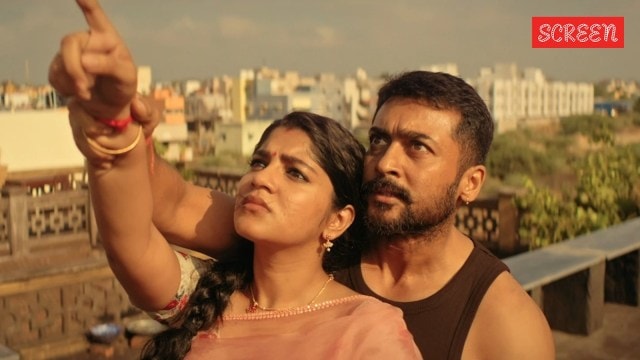Click here to follow Screen Digital on YouTube and stay updated with the latest from the world of cinema.
Five years of Soorarai Pottru: The Sudha Kongara-Suriya film shows what a mainstream biopic can be
Sudha Kongara’s Soorarai Pottru, which turns five this year, still feels like a jolt of adrenaline to a genre worn down by fatigue and overwrought formula.
 As Suriya’s Soorarai Pottru turns five, we look at what makes it a standout biopic.
As Suriya’s Soorarai Pottru turns five, we look at what makes it a standout biopic.Mainstream biopics have become a lost cause in more ways than one. A genre meant to offer a deep, immersive exploration of a fully lived life often ends up reduced to a live-action, Wikipedia-level recreation of events designed for easy consumption. Excessive background music, manufactured fiction, and heightened drama routinely stand in for the honest recreation of a human story. This is precisely why Sudha Kongara’s Soorarai Pottru stands out. The film, which turns five this year, still feels like a jolt of adrenaline to a genre worn down by fatigue and overwrought formula. Soorarai Pottru dramatized the life and times of Captain GR Gopinath and his extraordinary mission to democratize air travel through his low-cost airline, Simply Deccan.
The film isn’t content with simply recounting real events or sensationalizing a heroic news story into a fluffy, feel-good narrative. Instead, Sudha Kongara plunges us into the grimy, exhausting world of Nedumaaran Rajangam (Suriya), a hero defined as much by his ferocity as by his vision. He is a rebel ahead of the curve, a man with no patience for a world too slow to keep up with his dream of a socialist revolution.
In Soorarai Pottru, the biopic is not a cash-grabbing, sentimental exercise crafted for awards season, but a fiercely opinionated piece of storytelling with its own personality and idiosyncrasies. Maaran envisions a world where flying is no longer a luxury reserved for the elite but an accessible reality for everyone, irrespective of social or economic background.
Kongara, as a filmmaker, is comfortable mining the grit and emotional turmoil her hero in achieving his dreams. The film inherently knows that Maaran’s biggest enemy is the little setbacks and constant humiliations he has to face in his journey to attain the impossible. The goal– to make air travel an affordable exercise for people from all stratas of society, as outlandish as it sounds, seems far more attainable as we get to see the ferocious clarity with which Maaran untangles the complex web of economic constraints, regressive social order, systemic rot and institutional malfunction that hamper his dreams, one setback at a time. There is a surging tension in the way these events unfold, as opposed to the mandated screenplay beats usually seen in biopics.
Sudha Kongara and co-writer Shalini Usha Nair recognize the genre’s inherent pitfalls and instead use small, sharply observed details and emotional outbursts from Maaran’s life as anchor points. These moments elevate the familiar beats of a biographical drama into something intimate and cinematic. Take Maaran’s relationship with his wife, Sundari aka Bommi (Aparna Balamurali). Their dynamic is treated with the same urgency and emotional weight as his larger dream. Nothing is taken for granted. In one seemingly uneventful scene, Maaran struggles to summon the courage to ask Bommi for money. The hesitation, the discomfort, the bruised pride, all are rendered with a lived-in authenticity. Here is a man bold enough to challenge an entire system, yet momentarily emasculated at the thought of admitting vulnerability to his wife. It’s a beautifully observed moment that cuts through the usual biopic varnish and makes us immediately empathize with his predicament.
The writing humanises the hero through constant, grounded reminders that despite his superhuman ambitions, he is ultimately an ordinary man trying to find his place in the world. There is no attempt at overt glorification; instead, the film’s energy goes into deconstructing genre conventions, the supportive wife, the scheming corporate villain, the hero’s deteriorating finances, tropes often reduced to clichés in biopics. Maaran isn’t sanctified by these elements; rather, they expose the magnitude of what he must sacrifice to chase a dream that borders on the impossible. The film deploys these familiar beats with remarkable control, infusing each moment with a manic attention to character detail and a strong sense of identity that most biopics lack. Maaran’s raw, compulsive drive, his anger, his passion, his refusal to bend, carries more vitality than the protagonists of many recent “template biopics,” which often struggle to portray their heroes as living, breathing humans with recognisable frailties.
Suriya, in his National Award-winning performance, is the beating heart of Soorarai Pottru. He anchors the character with a disarming mix of vulnerability and grit. His eyes become a conduit for the unresolved trauma that fuels his ambition, an unrealized potential straining against the weight of a self-imposed mission that often feels impossibly out of reach. Even though we know the real-life story of G. R. Gopinath and how his efforts ultimately unfolded, Suriya’s startling empathy and fierce determination make the struggle feel urgent and uncertain. His portrayal sells the sweaty desperation of the journey so convincingly that we find ourselves asking, Will he actually be able to pull this off?
Suriya’s intensity can occasionally feel overpowering, but he makes the gradual shifts in his relentless pursuit feel entirely organic. His outbursts, whether directed at a complacent bank official, his wife, or even his closest friends, play like cathartic releases for a man being squeezed from all sides by a system that has no patience for risk-takers. The interactions between characters, the carefully seeded everyday details, and the constant peaks and troughs in Maaran’s arc feel like authentic outgrowths of a filmmaking mode that treats frustration and repeated rejection as an aesthetic in itself. It’s a tricky tightrope walk, as the film checks off many staples of the biopic genre, yet does so with unusual force and a steely sense of conviction.
There is nothing decorative about the female lead. Whenever the drama threatens to slip into familiar territory, Sudha Kongara injects a jolt of the unexpected in how Maaran and his wife respond to setbacks. The director’s female gaze is unmistakable: the tired archetype of the loving, self-sacrificing wife is upended and reimagined as a sharp, opinionated, fiercely self-assured woman who views herself as an equal participant in the journey, not a narrative accessory to be deployed at convenience.
Paresh Goswami (Paresh Rawal), the embodiment of privilege and entrenched class superiority, stands in stark contrast to the hustling hero who steps out each day to wage battles against an indifferent world. The parallel arcs of hero and villain are sharply etched. Sudha Kongara avoids reducing Paresh to a generic corporate overlord with a monopoly on the airline business; instead, his repeated refusals to support Maaran become a pointed critique of class bias. His resistance to the idea of democratised air travel is not just business strategy, it’s an instinctive recoil from a social shift that threatens the comfort and exclusivity of his own way of life. The antagonist is a man insulated by luxury unable to grasp why a more equitable system is necessary for those outside his privileged bubble.
In their very first meeting, Paresh ruthlessly dismisses Maaran’s socialist vision of unified air ticketing. Yet even in what could have been a routine hero-villain confrontation, Sudha Kongara loads the scene with revealing details that lay bare the class divide. Paresh doesn’t just disagree with Maaran, he views him as an inferior dreamer, a man from the fringes reaching far beyond his station. One of the film’s most telling gestures comes when Paresh shakes Maaran’s hand only to immediately sanitize his own, as if to cleanse himself of the ‘lowly’ man’s touch. These subtle choices add texture and political charge to an otherwise familiar exchange. The smirks, the bored dismissals, the casual cruelty, all become cinematic shorthand for how the privileged routinely belittle the aspirations of those daring to rise from below.
Soorarai Pottru needed a performer like Suriya to make Maaran’s eventual triumph feel generational. When his mother says, “We have won, Maara,” it resonates not just as personal vindication but as a social proclamation, a recognition that one man’s unrelenting belief can spark a revolution far larger than himself.
A typical biopic would eschew all this complexity for a simpler, moralizing narrative. But Sudha Kongara crafts a film built on subtle subversions and small acts of rebellion. It represents the best version of a commercial biopic: not a bland, PowerPoint-style recounting of a real life, but a richly textured emotional journey. The film uses the tools of mainstream cinema, soaring music, larger-than-life staging, propulsive drama, not to sentimentalize, but to deliver a story that feels urgent, humane, and profoundly affecting.
- 01
- 02
- 03
- 04
- 05


































